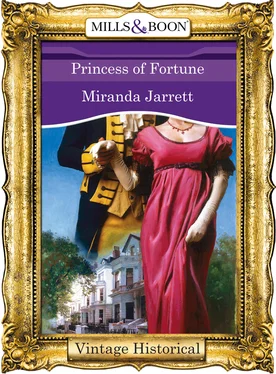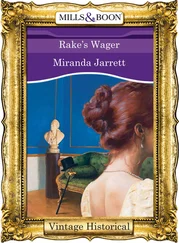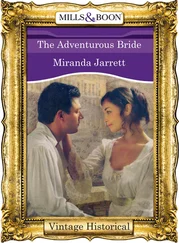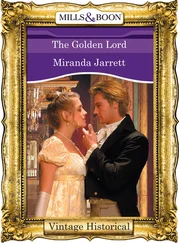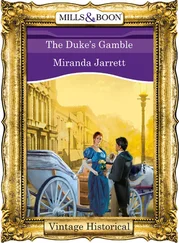“But ‘ma’am’ is the proper way to address you. Even our own queen is called ‘Your Majesty’ only for the first greeting, and ‘ma’am’ after that.”
“I am not your queen, am I?” Her frown matched his. “I am different. You are different. You are the only Londoner who has spoken to me in my own language, and it seems most barbarously wrong of you not to call me by my given name while we converse.”
“Call you by your Christian name?” he asked, incredulous. His experience with ladies might be limited, but he did know that most did not wish to be addressed after a few hours’ acquaintance with the same jolly familiarity used with a drinking crony in a tavern. Here he’d been worrying that he’d been too free, yet she was offended instead by his being too formal.
“Yes, yes. It will give me great comfort, and be so much better than the nanny-goat bleat.” She nodded with satisfaction, as if everything had been decided. “Whenever we are alone, or speaking Italian as we are now, you will call me Isabella. I give you leave. We will speak as friends, eh?”
How could he possibly refuse her when she’d no other real friends in the entire country? How cruel would it be to turn down such a humble request?
She snapped her fingers again, now less from annoyance than for emphasis. “In turn I shall call you whatever your name might be instead of ‘Captain.’ You do have another, don’t you?”
“It’s Thomas,” he said reluctantly. “Tom for short. But I’m not certain this is—”
“Thomas,” she repeated, testing the sound of the name. “Tom. Tomaso. That will do. Ah, here is that lazy maid at last with my chocolate. Set it down there, on that table.”
Tomaso: no one had called him that since he’d been a boy traveling the Continent with his family. Yet from her lips it sounded different, a silky, luxuriant ripple that couldn’t possibly refer to him.
So how in blazes was he supposed to say her name? “Ma’am” might sound like a goat’s bleat to her, but at least it had none of the sinuous, sensuous entrapment of Isabella.
He was saved for the moment as the servants entered with her requests, and he watched her dictate to them with appalling precision. The maid must place the silver tray with the chocolate pot and toast here, squared to the edge of the table. The footman must present the basin of water, holding it steady while she dipped one fingertip into the surface to judge the temperature, and then place it before the wicker-backed chaise, with the linen cloth folded in half over the arm.
“I know you judge me to be too picky, Tomaso,” she said once the servants left. “Perhaps I am. But there is a proper way for things to be done, and an improper one, as well. If standards aren’t kept, why, then, civilization is meaningless, and we should just as well go back to grunting and rooting about naked in the dirt like little piglets.”
“Yes, ma’am.” The unbidden image of her naked made him forget her request.
“Isabella,” she corrected him, fortunately unaware of his true thoughts as she sat on the settee and swung her legs up before her. “You will call me Isabella. Now be an honorable gentleman, and look away while I tend my sorry knees.”
But it was already too late for honorable discretion. Without waiting for him to oblige, she’d pulled her skirts up high over her garters and bent over to inspect her bruised, scraped knees.
She winced as she dribbled the cool water over them, then glanced up at Tom through her lashes.
“I told you to look away,” she said, wrinkling her nose and mouth at the sting of the cold water. “You are not being honorable.”
“Damnation, you have not given me the chance before you go and hike up your skirts!” he sputtered. She was wearing yellow lisle stockings with dark blue garters, the ribbons embroidered with red roses that, unfortunately, matched the scrapes on her knees—pale, plump knees which, scraped or not, were still quite fine to look upon. “What honorable lady would do such a thing, I ask you, let alone ask a gentleman to ignore it?”
She blinked, not at all embarrassed. “But I am not an honorable English lady, Tomaso. I am a princess, and I am entitled to ask whatever I please.”
He took a deep breath, making himself once again look at her face, an event that seemed to be happening far too frequently with her.
“Not that, ma’am,” he said as firmly as he could. “My orders regard your safety and well-being, not your—your modesty.”
“My modesty. How very English that sounds!” She grinned, and widened her eyes for emphasis. “Well, then. You have reasoned this better than any periwig judge. Since we are in England, I rescind my order. Look at my sad little knees if you wish, and I shall not protest.”
With a groan of frustration he dropped into the chair across from her, wondering if even one of those great admiralty lords had any idea of what he was going through.
“Why the devil aren’t you having one of the lady’s maids tend to you? What reason could you have for doing this here instead, except to plague me?”
“Because you are the only one who knows how it happened,” she said, dabbing at her knees. “I was impulsive and—and unwise. Stepping from a carriage without waiting for the step is something a simpleton would do, not a princess. The maidservants in this house whisper about me enough. They do not need to see that I have skinned my knees like a clumsy child. But you—I cannot have such a secret from you, can I?”
He hadn’t expected that. “You are fortunate you weren’t more badly hurt,” he said gruffly. “You could have broken your leg, or worse.”
“I’m fortunate in a great many ways, I suppose.” She dried her knees and flipped her skirts back down, smoothing them around her ankles for good measure. “I could also have been stabbed with a pair of embroidery scissors which, given my ineptitude at handwork, would have been most ironic.”
He frowned grimly. He supposed it was good that she could make light of it, but he could not. “‘Ironic’ isn’t the word I would have chosen.”
“It is better than the alternative, yes?” Her smile turned wistful. “What happened today in that shop was not your fault, Tomaso. You couldn’t have stopped more than you did. I have lived most of my life with the whole world watching, and I know no other way.”
“But I shouldn’t have let you go into that infernal shop in the first place.”
“That’s because you believe the best way to keep me safe is to lock me away, but that won’t do for me, not at all.”
She smoothed a stray lock of hair behind her ear, her smile turning bittersweet. “On my family’s crest are three lions, brave and fierce and ready for any challenge. That is how I am, too, Tomaso. Why else would I have come all this way on my own, away from my family and my home? I would rather face life with a roar than hide and quake with my hands over my eyes. Can’t you understand that, Tomaso, even being English?”
He grumbled, but he nodded, because it was the easiest reply, if not the best.
But he understood, all right. He understood that he was becoming more and more tangled in the complicated life of this small, fierce lioness, and there wasn’t a blasted thing he could do about it.
With her legs curled up beneath her, Isabella sat in the center of her bed and listened. She’d always been good at listening, particularly like this in the dark. There were a great many things that could be learned that way, stray bits and scraps of interesting information that others tossed away without a thought, information that could prove most useful.
Consider all she’d learned of Lord and Lady Willoughby and their establishment in the few short weeks that she’d been their guest. Simply by listening, she’d learned that the earl stayed downstairs drinking long after the countess had retired, and that when he finally came upstairs—his footsteps unsteady, muttering to himself—he’d go not to his wife’s bed, or even his own, but up another flight of stairs to the servants’ rooms, where he’d make the kitchen maid’s iron bedstead squeak off and on all night.
Читать дальше
